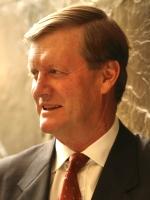Speaker A Very good question about what's different about human resources in a group like ours compared to say, 30 years ago. Firstly, I think we separated the notion of human resource management from industrial relations, and that was a bit of a move. And industrial relations is really about employee relations and is a responsibility of line management. It's the responsibility of the line. Human resource management is a different activity, well, different at each level in the organization. And we've started to think, and I'd say we used quite a bit of Elliot's thinking in terms of human resource management. What we've recognized is that higher up in the organization, we've got to be thinking about the development longer term. So we're focused on, in our group, the top 400. I spend my time thinking about the top 400, our head of human resources, and she would be better able to comment on some of this. Our head of human resources is thinking about ensuring we got the systems in place, that if you like those Nestling Russian dolls, we go down. So that in a particular division, they're thinking about their top 50 or 100, or whatever it is. And I think that some of Elliot's ideas about people one step removed, one step removed, judging potential, immediate manager, judging performance, and that's the accountability of line management. And I think that we've all seen examples when you get your immediate manager judging potential doesn't work. Doesn't work. But when one step removed, you can see the whole world differently. I've had examples of people telling me, one of their subordinates, he'll be ready for the next level. All he needs another 15 years doing x, Y and Z, and he's ready for retirement. So we've had those sort of examples. And I suppose if I look through my career and I say, how many management books have influenced me? There aren't many. I read up the organization in a trip to Canada in the early seventy s on a bus. And I think it epitomized so much of what I saw in our group. And I'd say, Elliot's work I found very interesting. It's quite intellectual, and you have to really be given time to absorb it. I'm not sure I agree with every single thing in there, or maybe it's just so difficult to implement. But it certainly awakened me to thinking about organization very differently. And I'd have to say, where I sit now, I spend a fair bit of time thinking about that, and I've found it pretty interesting. You, Sam?
Elliott Jaques\' Contribution to a New Way of Organizing Human Resources in a Global Company
Summary
- We've separated the notion of human resource management from industrial relations. What we've recognized is that higher up in the organization, we've got to be thinking about the development longer term. Elliot's work has awakened me to thinking about organization very differently.
Speaker A Very good question about what's different about human resources in a group like ours compared to say, 30 years ago. Firstly, I think we separated the notion of human resource management fr...
Transcript of the presentation video
NOTE: This transcript of the video was created by AI to enable Google's crawlers to search the video content. It may be expected to be only 96% accurate.
Country
UK
Date
2005
Duration
3:29
Language
English
Format
Interview
Organization
Rio Tinto
Video category
Major organizations and consulting firms that provide Requisite Organization-based services

A global association of academics, managers, and consultants that focuses on spreading RO implementation practices and encouraging their use
Dr. Gerry Kraines, the firms principal, combines Harry Levinson's leadership frameworks with Elliott Jaques's Requisite Organization. He worked closely with Jaques over many years, has trained more managers in these methods than anyone else in the field, and has developed a comprehensive RO-based software for client firms.




